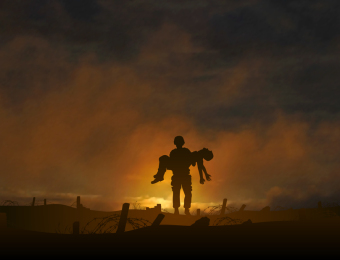50 Shades of Gray's Anatomy
Guest Post by Palak Shah

At the end of my first term in medical school, as I made the journey back home, I felt like a wounded warrior granted armistice carrying home a temporary olive branch. My enemies were my tests, my weapon was my mental faculties, and the prize was far too distant to even be conceivable: receiving an MD. Medical students often talk about transformations and the alterations each student undergoes in their plight for success at the onset of medical school. For me, however, “change” doesn’t do the experience justice; it’s more of a developmental revolution or overhaul.
Needless to say, when I finally went home for winter break at the end of term one, I felt like a fish out of water. I’ve made the trip home several times. This time, however, the bags under my eyes and increase in grays in my hair served as permanent mementos from a world quite different than the one I left. Let’s get real here: medical school is this alternate universe where for 100 or so days at a time, you’re force-fed more information than you know what to do with until you’re dry-heaving endless facts and tidbits of the human body on some squalid bathroom floor. Constant cramming becomes your way of life while sleeping gets pushed aside as some non-tangible ideal. You’re a slave to your test scores. You’re married to your books. You’re obsequious to your coursework.
And then you come home with free-time galore, almost shell-shocked, that you barely know what to do with yourself, like a man on a fast for weeks suddenly unearthing a massive cornucopia of his favorite fatty foods. Eating without abandon in too short a time, and the man could end up regretting his decision. While all of us are glad to temporarily discard our backpacks and peremptorily forsake the library, it’s easy to forget how to walk on our own two feet without our books as crutches. There are some parts of us that are forever lost by the innocence-killing machine that is medical pedagogy.
I tried to fill up my time by reconnecting with all the friends and family I’d been neglecting. In between exchanging war stories and sharing updates on our lives, there are moments where I asked myself, what’s the point? I came to the realization that sometimes coming back home is like trying to adapt to quicksand. As hard as you fight to stay relevant in the lives of the people you leave behind to enter the portal of medicine, you find yourself inevitably on uneven ground, helplessly sinking.
Other people tend to group your life problems as adolescent and lump them under “school.” As if, my 5-year old niece who just started kindergarten and me, twenty years older, can relate on all levels in terms of where we are in our lives simply because we’re both “students.” I don’t blame them; it’s only natural to think this way because no description will do justice to the actual reality of living through medical school. It’s like the juxtaposition between someone describing what it’s like to be in outer space and actually blasting through the earth’s stratosphere. You can conjecture to the best of your ability to recreate the experience in your mind, but you never really know until you know.
So when I go home and hear my friends rhapsodize about the new developments in their life with wedding planning, joint bank accounts, house-hunting, 401Ks and “real-world” crisis, I understand how my life seems developmentally delayed. While they’re consumed with 50 Shades of Grey, I’m enthralled with 50 Shades of Gray’s Anatomy. Sure, we, as medical students, sweat, worry, fight, and risk just as much our non-medical counterparts out in the “real” world, but our advancement seems much more less remarkable until we actually ”finish” school (in actuality, the schooling never really does end in medicine). Our progress is much more behind-the scenes. It may seem as if we’re tarrying, but the truth is, we’re doing just fine.
We’ll have our day where we’re not just seen as zombies with backpacks. People will take us seriously but the question then lies, will we want them to? We’ll probably find that the hullabaloo of participating in the equalizing effect of “adulthood problems” is highly overrated, and we’ll be longing for days where our top priorities were to study, study, and study some more. Worse comes to worse, if you still find yourself at odds with both growing up and growing out-of-touch with those you left at home, Taco Bell, Hemingway, and alcohol are three friends that repeatedly deliver and never judge. I know this from experience.
About: Palak Shah is an MD/MPH student at St. George's University in the West Indies. He blogs at Shah Blah Blah.


 Yo! Post a Comment
Yo! Post a Comment







"I wouldn't do it twice, but I would not 'not' do it once."
- ZDoggMD